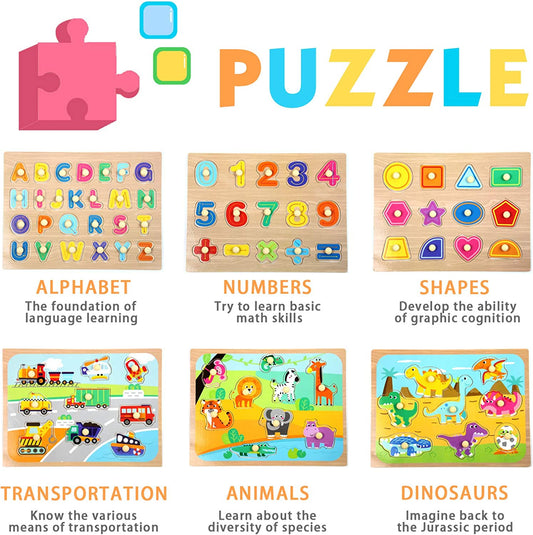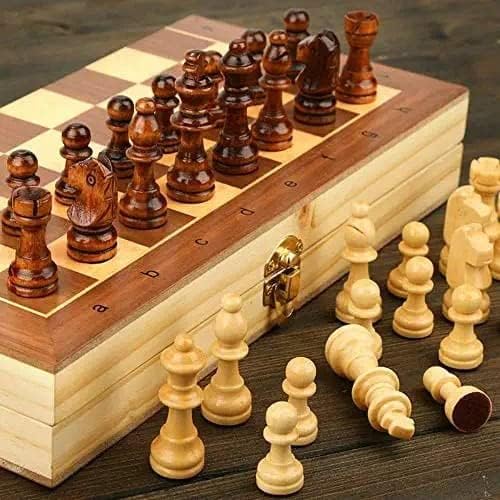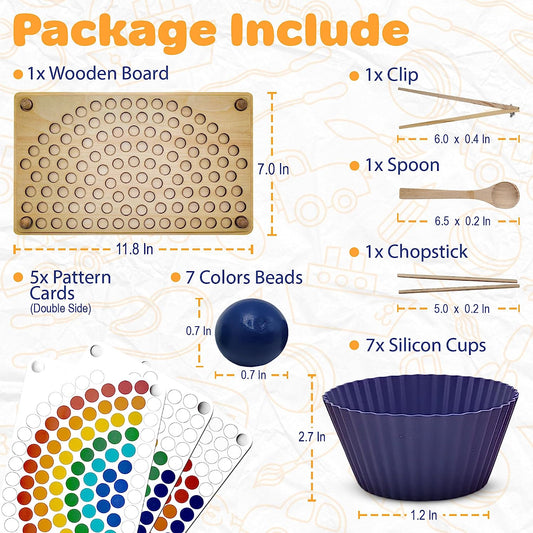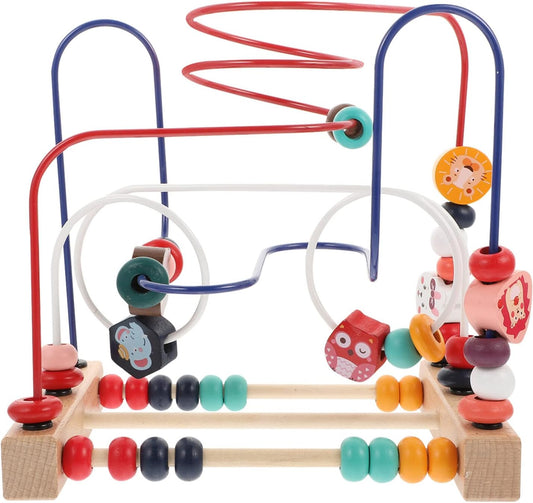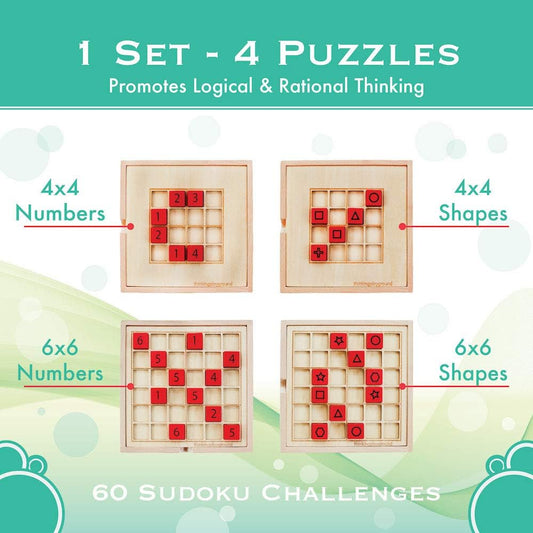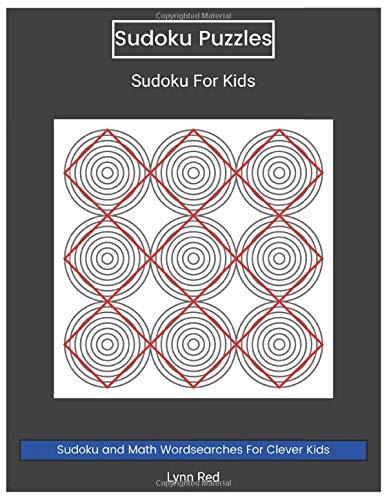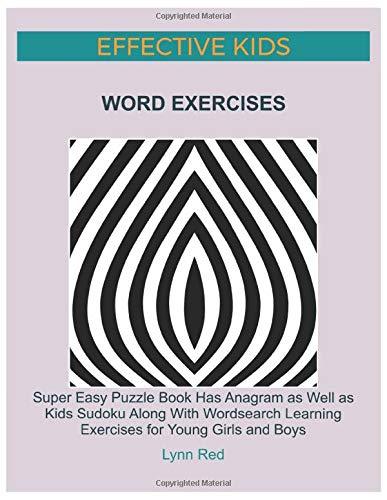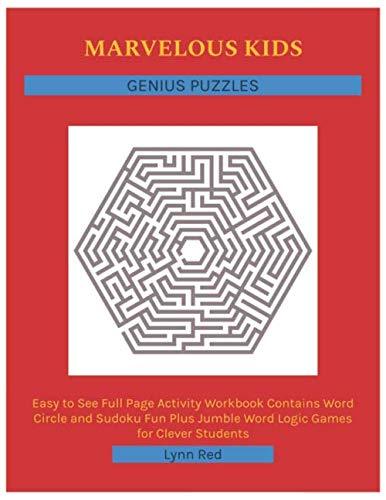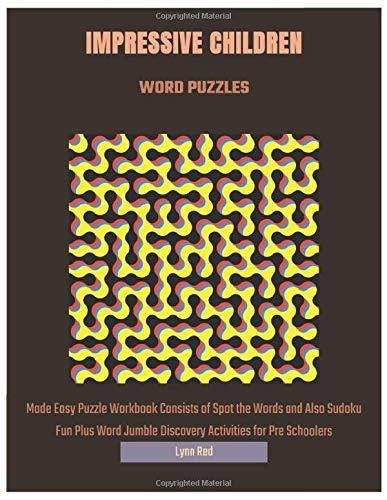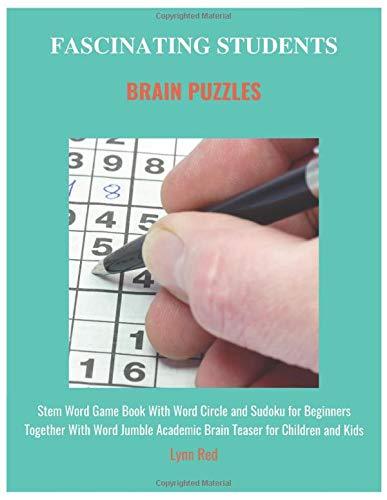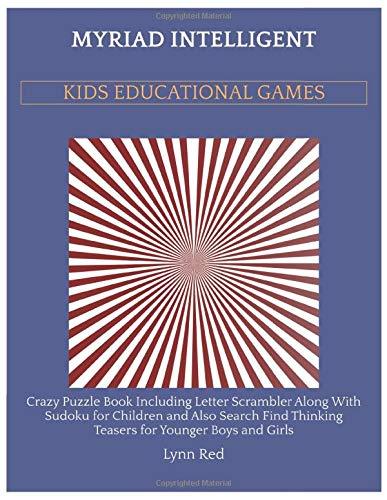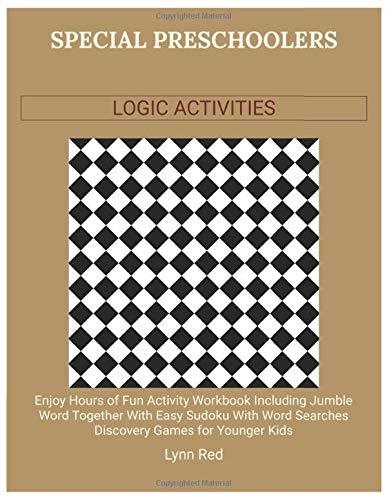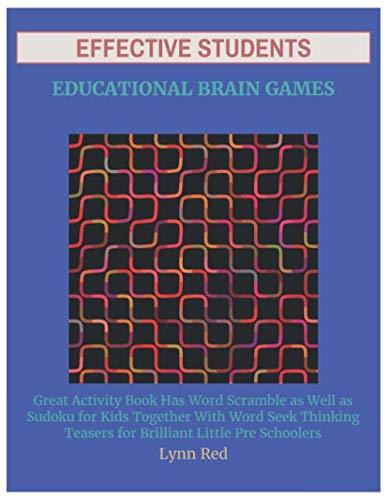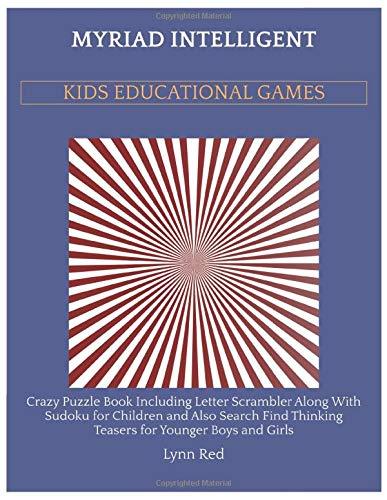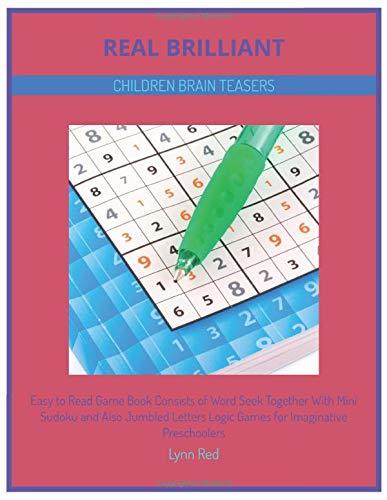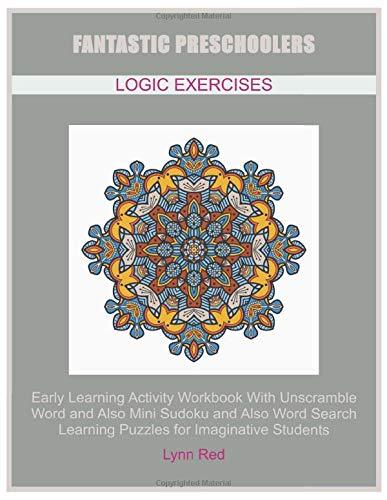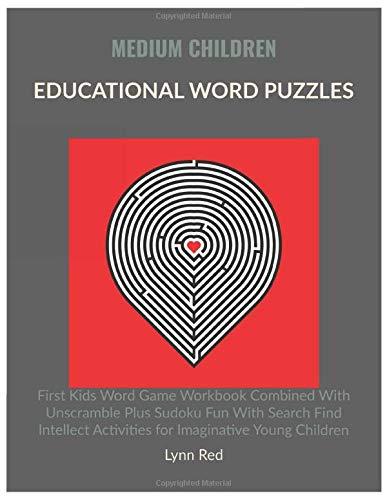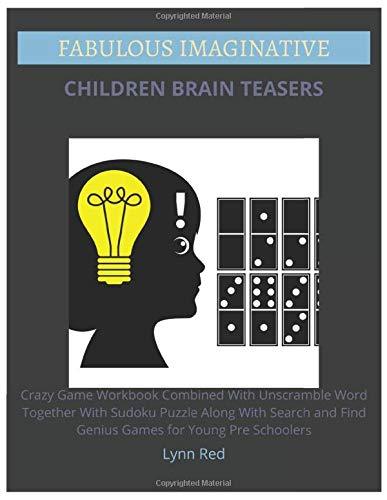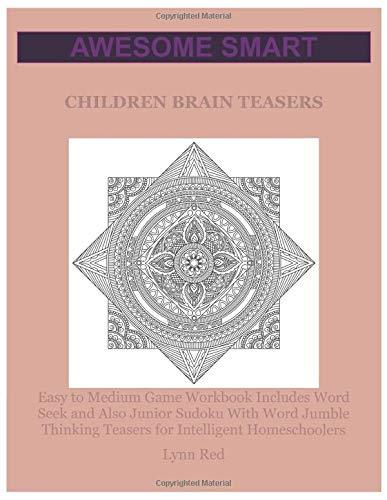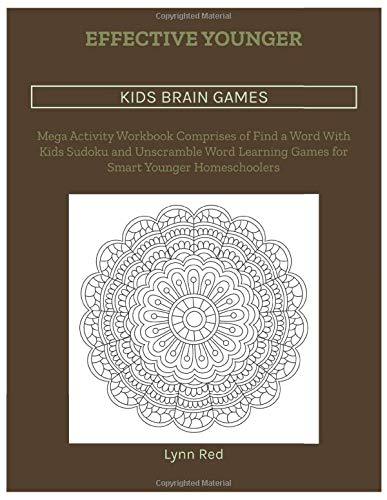-
Wooden Sudoku Board Game with Drawer - with Book of 100 Sudoku Puzzles for Adults - Brain Teaser Desktop Toys
Regular price $35.39 USDRegular priceUnit price / per$48.84 USDSale price $35.39 USDSale -
Toddler Puzzles and Rack Set, Wooden Peg Puzzles Bundle with Storage Holder Rack, Educational Knob Puzzle for Kids Age 2 3 4 Years - Alphabet Number Shape Dinosaur Animal Vehicle
Regular price $41.99 USDRegular priceUnit price / per$52.07 USDSale price $41.99 USDSale -
Wooden Chess Board , Professional Tournament Chessboard Wooden Chess Set Board Game for Adults and Kids Checkers Game for Kids & Adults by RTROVEANTIQUES
Regular price $120.00 USDRegular priceUnit price / per$170.40 USDSale price $120.00 USDSale -
Store Wooden Pegboard Beads Game, Rainbow Color Board Games, Puzzle Board, Toys, Preschool Learning Activities, Boys and Girls Gift for 3 and up!
Regular price $31.19 USDRegular priceUnit price / per$42.42 USDSale price $31.19 USDSale -
3D Brain Teasers Metal Puzzles Toy, Mind Puzzles for Adults Hand Smart Gifts for Boy and Girls Gold and Silver
Regular price $37.19 USDRegular priceUnit price / per$55.41 USDSale price $37.19 USDSale -
3 pcs Circle Puzzle Cube Skill Around Baby Toy Er Beads Maze, Gift Improvement Educational Toys Maze Bead for Kids Birthday Wooden Children Wood Multifunctional Activity Toddlers
Regular price $94.07 USDRegular priceUnit price / per$133.58 USDSale price $94.07 USDSale -
Double The Fun: Wooden Sudoku Puzzle Game for Kids with 4x4 and 6x6 Grids and 60 Challenges
Regular price $29.87 USDRegular priceUnit price / per$43.91 USDSale price $29.87 USDSale -
Sudoku Puzzles: Sudoku For Kids
Regular price $9.95 USDRegular priceUnit price / per -
EFFECTIVE KIDS WORD EXERCISES: Super Easy Puzzle Book Has Anagram as Well as Kids Sudoku
Regular price $9.95 USDRegular priceUnit price / per -
MARVELOUS KIDS GENIUS PUZZLES: Easy to See Full Page Activity Workbook Contains Word Circle
Regular price $9.95 USDRegular priceUnit price / per -
IMPRESSIVE CHILDREN WORD PUZZLES: Made Easy Puzzle Workbook Consists of Spot the Words
Regular price $9.95 USDRegular priceUnit price / per -
Fascinating Students Brain Puzzles: Stem Word Game Book With Word Circle and Sudoku for Beginners
Regular price $9.95 USDRegular priceUnit price / per -
Fantastic Children Educational Games: Large Print Word Game Workbook Comprises of Word Scramble
Regular price $9.95 USDRegular priceUnit price / per -
Myriad Intelligent Kids Educational Games: Crazy Puzzle Book Including Letter Scrambler
Regular price $9.95 USDRegular priceUnit price / per -
Special Preschoolers Logic Activities: Enjoy Hours of Fun Activity Workbook Including Jumble Word
Regular price $9.95 USDRegular priceUnit price / per -
Effective Students Educational Brain Games: Great Activity Book Has Word Scramble
Regular price $9.95 USDRegular priceUnit price / per -
Myriad Intelligent Kids Educational Games: Crazy Puzzle Book Including Letter Scrambler
Regular price $9.95 USDRegular priceUnit price / per -
Real Brilliant Children Brain Teasers: Easy to Read Game Book Consists of Word Seek
Regular price $9.95 USDRegular priceUnit price / per -
Fantastic Preschoolers Logic Exercises: Early Learning Activity Workbook With Unscramble Word
Regular price $9.95 USDRegular priceUnit price / per -
Medium Children Educational Word Puzzles: First Kids Word Game Workbook Combined With Unscramble
Regular price $9.95 USDRegular priceUnit price / per -
Fabulous Imaginative Children Brain Teasers: Crazy Game Workbook Combined With Unscramble Word
Regular price $9.95 USDRegular priceUnit price / per -
Selection Kids Educational Word Games: Educational Puzzle Workbook Incorporates Anagram Scramble
Regular price $9.95 USDRegular priceUnit price / per -
Awesome Smart Children Brain Teasers: Easy to Medium Game Workbook Includes Word Seek
Regular price $9.95 USDRegular priceUnit price / per -
Effective Younger Kids Brain Games: Mega Activity Workbook Comprises of Find a Word
Regular price $9.95 USDRegular priceUnit price / per
Collection: Cognitive Skill Improvement
Boost Your Brain: A Guide To Cognitive Skill Improvement
Did you know that the human brain has over 100 billion neurons, each capable of forming thousands of connections? This incredible organ is responsible for everything we think, feel, and do.
And just like any other muscle in your body, your brain can be trained and strengthened to improve its cognitive skills.
In this comprehensive guide to cognitive skill improvement, you will discover evidence-based strategies to boost your brain power. From enhancing memory and problem-solving skills to sharpening focus and creativity, this guide will provide you with the tools and techniques needed to unlock your full cognitive potential.
But it's not just about intellectual prowess. Managing stress and maintaining mental well-being are crucial elements in optimizing your cognitive abilities. Embracing lifelong learning and staying socially connected also play a significant role in keeping your brain sharp.
Are you ready to harness the power of your mind? With consistency, persistence, and the right mindset, you can take control of your cognitive growth and achieve remarkable results.
Let's embark on this transformative journey together as we explore how to boost your brain: A Guide to Cognitive Skill Improvement.
Key Takeaways
- Cognitive skills can be improved through various strategies such as setting goals, organizing information, practicing mindfulness, and engaging in physical exercise.
- Enhancing problem-solving abilities is important in personal and professional life and can be achieved through divergent thinking, analytical skills, decision-making frameworks, diverse perspectives, and embracing failure.
- Focus and attention can be sharpened for optimal brain performance by practicing mindfulness exercises and using time blocking techniques.
- Boosting creativity is essential for success and can be achieved by engaging in activities that stimulate divergent thinking, exposing oneself to new experiences and environments, and practicing mindfulness meditation.
Understand the Basics of Cognitive Skills
To truly boost your brain and maximize cognitive skill improvement, it's essential that you understand the basics of cognitive skills.
Cognitive skills refer to the mental processes that enable us to acquire knowledge, process information, and solve problems. They are crucial for daily life as they directly impact our ability to think critically, make decisions, and perform tasks efficiently.
Understanding the importance of cognitive skills in daily life is key to unlocking their full potential. These skills allow us to learn new concepts quickly, adapt to changing situations, and communicate effectively. By improving our cognitive skills, we can enhance our overall performance in various areas such as work, academics, and personal relationships.
There are several techniques for improving cognitive skills that have been extensively researched and proven effective. Strategies such as setting goals, organizing information, practicing mindfulness, and engaging in regular physical exercise can help sharpen cognitive abilities. Additionally, specific exercises like puzzles or memory games can target different aspects of cognition and provide a challenging workout for your brain.
As we delve deeper into this guide on boosting your brain's power through cognitive skill improvement, let's transition into the subsequent section about how you can improve your memory.
Improve Your Memory
Ironically, enhancing your memory can be as simple as playing a few rounds of memory-boosting games. Research has shown that engaging in activities that challenge your brain's ability to remember and recall information can significantly improve concentration and enhance recall.
One such game is the classic card game, Concentration, where you match pairs of cards by remembering their positions. Another popular option is the digital game Lumosity, which offers a variety of memory-based exercises designed to stimulate different areas of your brain.
In addition to playing memory games, there are other strategies you can incorporate into your daily routine to improve your memory. For instance, practicing mindfulness meditation has been found to enhance working memory capacity and cognitive control. Regular physical exercise has also been shown to have positive effects on memory and overall brain health.
By incorporating these activities into your lifestyle, you can boost your brain's ability to retain and retrieve information more efficiently. This will not only improve your daily life but also give you an edge in tasks that require powerful cognitive skills.
Transitioning into the subsequent section about enhancing problem-solving skills, it's important to note that improving your memory lays a solid foundation for developing effective problem-solving abilities.
Enhance Your Problem-Solving Skills
Developing strong problem-solving skills is crucial in navigating life's challenges and finding innovative solutions to complex problems. Improving critical thinking and enhancing problem-solving abilities can give you a significant advantage in both your personal and professional life.
Here are five ways to boost your problem-solving skills:
-
Practice divergent thinking: This involves generating multiple ideas or solutions to a given problem, encouraging creativity and expanding possibilities.
-
Develop analytical skills: Analytical thinking allows you to break down complex problems into smaller, more manageable parts, enabling you to identify patterns and make logical connections.
-
Utilize decision-making frameworks: Decision-making frameworks provide a structured approach for evaluating options, considering risks, and selecting the best course of action.
-
Seek diverse perspectives: Engaging with people from different backgrounds and viewpoints can broaden your understanding of a problem and lead to more innovative solutions.
-
Embrace failure as an opportunity for growth: Viewing failures as learning experiences helps develop resilience, adaptability, and an open mindset.
By incorporating these strategies into your daily life, you can improve your critical thinking abilities and enhance problem-solving skills. These skills will not only help you overcome obstacles but also enable you to find unique solutions that others may overlook.
Transitioning into the subsequent section about 'sharpen your focus and attention,' it is essential to cultivate these cognitive abilities alongside sharpening your focus and attention for optimal brain performance.
Sharpen Your Focus and Attention
Sharpen your focus and attention to unlock the full potential of your mind and discover hidden insights that can lead to incredible breakthroughs. Improving focus and attention is crucial for enhancing cognitive skills and achieving power in your pursuits.
Two effective ways to improve focus and attention are through mindfulness exercises and time blocking techniques.
Mindfulness exercises involve training your mind to stay present, eliminating distractions, and focusing on the task at hand. By practicing mindfulness regularly, you can strengthen your ability to concentrate, ignore irrelevant information, and maintain a clear mental state conducive to problem-solving. Research has shown that mindfulness exercises not only improve attention but also enhance memory retention and overall cognitive performance.
Time blocking is another powerful technique for sharpening focus and attention. Breaking your day into specific blocks of time dedicated to different tasks helps eliminate multitasking and promotes deep concentration on one task at a time. By allocating focused periods for work without interruptions or distractions, you can maximize productivity and train your brain to sustain attention for longer durations.
By incorporating mindfulness exercises into your daily routine and implementing time blocking techniques, you will boost your ability to concentrate deeply on tasks requiring high cognitive demand. This enhanced focus will pave the way for the subsequent section about boosting creativity by unleashing the full potential of your mind's imaginative capacity.
Boost Your Creativity
Unleash the full potential of your mind's imaginative capacity by tapping into your creative genius. Boosting your creativity is essential for achieving success in both personal and professional endeavors. By enhancing your imagination, you can unlock innovative thinking and problem-solving skills that will set you apart from the competition.
To boost your imagination, engage in activities that stimulate divergent thinking. This involves exploring multiple perspectives and generating a wide range of ideas. Brainstorming sessions, mind mapping exercises, and free writing are effective techniques to enhance your creative thinking abilities.
Additionally, exposing yourself to new experiences and environments can fuel your imagination. Traveling to unfamiliar places, reading diverse literature, or engaging in artistic pursuits can provide fresh stimulus for innovative ideas.
Research has shown that practicing mindfulness meditation can also enhance creative thinking. By quieting the mind and focusing on the present moment, you create space for new connections and insights to emerge.
Remember, creativity is not limited to artists or designers; it's a skill that everyone possesses. By consciously seeking out opportunities to boost your imagination, you can unleash your innovative thinking potential.
Transitioning into the subsequent section about developing effective learning strategies: Now that you've tapped into your creative genius, it's time to explore how developing effective learning strategies can further optimize your cognitive skills.
Develop Effective Learning Strategies
To develop effective learning strategies, you need to utilize spaced repetition, active learning techniques, and take regular breaks.
Spaced repetition involves reviewing information at increasing intervals over time to strengthen memory retention.
Utilizing active learning techniques such as problem-solving and hands-on activities promotes deeper understanding and engagement with the material.
Taking regular breaks allows your brain to rest and recharge, improving focus and overall cognitive performance.
Research has shown that implementing these strategies can lead to more efficient and effective learning outcomes.
Use Spaced Repetition
By incorporating spaced repetition into your study routine, you'll find that information becomes more deeply ingrained in your memory.
Spaced repetition is a learning technique that involves reviewing material at increasing intervals over time. This method has been shown to significantly improve learning and enhance retention compared to traditional cramming methods.
When you space out your review sessions, your brain is forced to retrieve the information from long-term memory, strengthening the neural pathways associated with that knowledge.
To effectively use spaced repetition:
-
Create a study schedule: Plan out regular review sessions spaced apart by predetermined intervals.
-
Prioritize difficult content: Focus on reviewing topics or concepts that are challenging for you.
-
Utilize flashcards or digital tools: These resources can help facilitate the spaced repetition process by presenting information in a systematic and organized manner.
By utilizing spaced repetition as part of your learning strategy, you'll optimize the efficiency of your studying and reinforce long-term retention of information.
In the next section about utilizing active learning techniques, we will explore additional strategies to further enhance your cognitive skills.
Utilize Active Learning Techniques
Engage in active learning techniques to take your studying to the next level and truly immerse yourself in the material, making it come alive in your mind. Active learning techniques have been proven as effective learning strategies that enhance comprehension and retention.
By actively participating in the learning process, such as through discussions, debates, and problem-solving activities, you create a deeper connection with the subject matter. This engagement stimulates critical thinking and analytical skills while reinforcing neural pathways associated with memory formation.
Research shows that active learners consistently outperform passive learners when it comes to knowledge acquisition and long-term retention. These techniques encourage higher-order cognitive processes like analysis, evaluation, and synthesis. Incorporating active learning into your study routine not only strengthens your understanding of the material but also enhances overall cognitive functioning.
As we transition into discussing taking regular breaks, remember that incorporating active learning techniques is an essential step towards optimizing your brain's capacity for learning and processing information efficiently.
Take Regular Breaks
Making sure to schedule regular breaks throughout your study sessions allows for improved focus and better overall retention of the material. Research has shown that taking short breaks during intensive cognitive tasks can actually improve productivity and reduce mental fatigue.
When you constantly engage in intense mental activity without giving yourself a chance to rest, your brain becomes fatigued, leading to decreased concentration and diminished learning capacity. Taking regular breaks helps combat this fatigue by allowing your brain to recharge and reset.
By incorporating short periods of relaxation into your study routine, you give your mind time to process information and consolidate memories, resulting in enhanced cognitive performance. So remember, don't underestimate the power of taking regular breaks when it comes to improving your analytical thinking skills.
Improve Your Analytical Thinking
To improve your analytical thinking, you need to develop certain key skills.
First, you should focus on analyzing data and information effectively by breaking it down into smaller parts and examining each piece closely.
Secondly, practicing logical reasoning is crucial in sharpening your ability to think critically and make sound decisions based on evidence and reasoning.
Lastly, solving puzzles and brain teasers can enhance your problem-solving skills and stimulate your cognitive abilities.
By honing these skills, you'll become a more efficient thinker and decision-maker in various situations.
Analyze Data and Information
Improve your cognitive skills by becoming a data analysis genius, capable of effortlessly deciphering complex information. Analyzing data visualization is a crucial skill that can enhance your critical thinking abilities.
By examining graphs, charts, and other visual representations of data, you can uncover patterns and trends that may not be immediately apparent. This allows you to make informed decisions based on evidence and facts rather than relying solely on intuition or guesswork.
Research has shown that individuals who excel at analyzing data are more likely to succeed in various fields, from business to science. The ability to interpret and synthesize information is a powerful tool that can give you an edge over others in today's competitive world.
By improving your analytical thinking skills through data analysis, you will sharpen your mind and develop the mental agility necessary for success. Practice logical reasoning to further enhance your cognitive abilities and unlock even greater potential for growth and achievement.
Practice Logical Reasoning
Let's dive into the art of logical reasoning and uncover the secrets to sharpening our cognitive abilities. Logical reasoning practice is an essential component of critical thinking development. By engaging in regular exercises that challenge your ability to analyze information, make connections, and draw conclusions, you can enhance your logical thinking skills.
To paint a vivid picture in your mind, imagine yourself tackling complex puzzles that require you to identify patterns, solve intricate problems systematically, and evaluate multiple possibilities before arriving at a solution. Picture yourself dissecting arguments and identifying flaws in reasoning with precision and ease. Envision yourself confidently navigating through a labyrinth of information, effortlessly distinguishing between relevant data and irrelevant noise.
By incorporating logical reasoning practice into your daily routine, you'll empower your mind with the tools necessary for effective decision-making and problem-solving. So let's now transition into the subsequent section about solving puzzles and brain teasers...
Solve Puzzles and Brain Teasers
Get ready to put your thinking cap on and dive into the world of puzzles and brain teasers, where you'll have a blast challenging your mind and solving tricky riddles.
Engaging in these activities can significantly improve cognitive skills and enhance problem-solving abilities. Research has shown that regularly solving puzzles and brain teasers can strengthen neural connections in the brain, leading to improved memory, attention, and reasoning skills.
These challenging tasks require you to think outside the box, analyze patterns, and apply logical reasoning strategies. By consistently practicing these activities, you can sharpen your cognitive abilities and become a more efficient problem solver.
So get started today and reap the benefits of enhanced cognitive skills.
As you enhance your decision-making skills in the next section, remember that every challenge you face is an opportunity for growth.
Enhance Your Decision-Making Skills
Enhancing your decision-making skills is like having a GPS system for your brain, guiding you towards the best path to take in any situation. It allows you to make informed choices based on critical thinking and problem-solving abilities.
To improve your critical thinking skills, consider the following subtopics:
-
Analyzing Information: Train yourself to carefully evaluate and interpret data from various sources. This skill will help you make more informed decisions by considering all relevant factors.
-
Evaluating Options: Enhance your ability to assess different options and their potential outcomes. By weighing the pros and cons of each choice, you can select the most advantageous course of action.
-
Assessing Risks: Develop your capacity to identify and evaluate risks associated with different decisions. Understanding potential risks empowers you to take calculated risks while minimizing negative consequences.
By honing these subskills, you will enhance your overall decision-making process, allowing you to navigate life with confidence and precision. With improved critical thinking abilities, enhanced problem-solving skills, and a strategic approach to decision-making, cultivating a growth mindset becomes even more achievable. Transitioning into the next section about 'cultivate a growth mindset,' it is important to recognize that enhancing decision-making skills is just one step in the pursuit of cognitive improvement.
Cultivate a Growth Mindset
Developing a growth mindset empowers you to embrace challenges, learn from failures, and continuously improve yourself. A growth mindset is the belief that your abilities can be developed through dedication and hard work. It is about shifting your perspective from a fixed mindset to one that thrives on continuous improvement.
Research has shown that individuals with a growth mindset are more likely to achieve success in various domains of life. Positive thinking plays a significant role in cultivating a growth mindset. When faced with challenges, instead of viewing them as obstacles, individuals with a growth mindset see them as opportunities for personal growth and development. They believe that their efforts and strategies will lead to progress, even if they encounter setbacks along the way.
Cultivating a growth mindset requires self-awareness and intentional effort. Start by recognizing any negative thought patterns or limiting beliefs that may be holding you back. Challenge these thoughts by reframing them in a positive and empowering way. Surround yourself with like-minded individuals who also value personal growth and encourage each other's progress.
Developing a growth mindset through positive thinking is essential for cognitive skill improvement. By adopting this mentality, you empower yourself to overcome challenges and continuously strive for excellence. In the next section about staying mentally stimulated, we will explore additional strategies to enhance your cognitive abilities without feeling overwhelmed or discouraged by the process.
Stay Mentally Stimulated
To stay mentally stimulated and boost your cognitive skills, you can engage in various activities. Reading books and articles helps to enhance your knowledge, expand your vocabulary, and improve your critical thinking abilities.
Engaging in brain games and puzzles challenges your mind, promotes problem-solving skills, and enhances memory retention.
Lastly, learning a new skill or language not only fosters personal growth but also stimulates different areas of the brain, improving cognitive flexibility and overall mental agility.
Incorporating these activities into your routine can lead to significant cognitive improvements over time.
Read Books and Articles
Expand your mind and boost your cognitive skills by diving into books and articles. Developing strong reading habits is crucial for improving your cognitive abilities. Reading not only enhances your vocabulary and comprehension skills, but it also stimulates critical thinking and problem-solving abilities.
To make the most of your reading experience, ensure that you're accessing reliable sources. Seek out reputable authors, publishers, and publications known for their expertise in the subject matter. This will ensure that you're receiving accurate information and expanding your knowledge base effectively.
Additionally, incorporating a variety of genres and topics in your reading repertoire can broaden your perspectives and enhance creativity. By immersing yourself in well-written materials from trustworthy sources, you'll sharpen your analytical skills and ignite intellectual curiosity.
Transitioning to the subsequent section about engaging in brain games and puzzles, continue on this path to unlock the full potential of your cognitive capabilities.
Engage in Brain Games and Puzzles
Immerse yourself in brain games and puzzles to ignite your cognitive abilities and unlock the full potential of your mind. Brain training through these activities has been shown to enhance problem-solving techniques and boost overall cognitive function.
Research suggests that engaging in brain games stimulates the brain's neural pathways, improving memory, attention, and reasoning skills. Studies have found that regular participation in puzzles like crosswords or Sudoku can lead to improvements in cognitive performance over time. These games challenge your brain by requiring you to think critically, make connections, and find creative solutions.
As you solve problems and overcome challenges presented by these games, your brain forms new connections and strengthens existing ones. By incorporating brain games into your daily routine, you can develop a sharper mind capable of tackling complex tasks with ease.
So let's explore how learning a new skill or language can further enhance your cognitive abilities without delay.
Learn a New Skill or Language
Little did you know, picking up a new skill or language can actually be an entertaining way to unlock the hidden potential of your mind. Research has shown that learning a musical instrument or exploring a new hobby can have significant cognitive benefits. Here are five reasons why incorporating these activities into your daily routine can enhance your brainpower:
- Boosts memory and attention span
- Enhances problem-solving skills
- Improves multitasking abilities
- Increases creativity and innovation
- Enhances overall cognitive function
By engaging in these activities, you're stimulating various regions of your brain, strengthening neural connections, and promoting neuroplasticity. These changes result in improved cognitive performance and increased mental flexibility. So go ahead, indulge yourself in learning that guitar or exploring a new hobby—it's not just enjoyable but also beneficial for unleashing the full potential of your mind.
Now let's transition into the subsequent section about taking care of your physical health without skipping a beat.
Take Care of Your Physical Health
Maintaining a healthy lifestyle is crucial for enhancing your cognitive skills, so make sure to take care of your physical health.
To maintain physical fitness, engage in regular exercise that includes both cardiovascular and strength training activities. Physical exercise has been shown to increase blood flow to the brain, promoting the growth of new neurons and improving cognitive function.
In addition to exercise, it's important to eat a healthy diet that nourishes your brain. Include foods rich in antioxidants, such as berries and leafy greens, which protect brain cells from damage caused by free radicals. Omega-3 fatty acids found in fish like salmon can also support brain health.
Research has consistently shown that maintaining physical health through exercise and a balanced diet positively impacts cognitive abilities such as memory, attention span, and problem-solving skills. By incorporating these lifestyle choices into your daily routine, you're actively supporting the power of your mind.
As we move on to discussing how stress management and mental well-being contribute to cognitive skill improvement, remember that taking care of your physical health lays a strong foundation for overall brain function.
Manage Stress and Mental Well-being
To effectively manage stress and improve your mental well-being, it's essential to practice stress management techniques. This can include deep breathing exercises, meditation, or engaging in physical activities such as yoga or tai chi.
Seeking support from others is also crucial, whether it's through talking to a trusted friend or family member or seeking professional help from a therapist.
Additionally, prioritizing self-care activities such as getting enough sleep, eating a balanced diet, and engaging in hobbies that bring you joy can significantly contribute to reducing stress levels and promoting overall mental well-being.
Practice Stress Management Techniques
When life gets tough, it's important to remember that 'a calm sea never made a skilled sailor.' To boost your cognitive skills, you must learn to effectively manage stress.
Stress can hinder cognitive function and impede learning and memory processes. By incorporating stress reduction techniques into your daily routine, such as mindfulness exercises, you can improve your mental well-being and enhance cognitive performance.
Mindfulness exercises promote relaxation and focus by bringing attention to the present moment. Research has shown that regular practice of mindfulness can reduce stress levels, enhance emotional regulation, and improve working memory capacity. Techniques like deep breathing, meditation, and body scans are effective in calming the mind and reducing anxiety.
By practicing stress management techniques consistently, you can cultivate a powerful mindset that allows you to navigate challenges with grace. Seeking support from others is another crucial aspect of managing stress effectively.
Seek Support from Others
To truly excel in boosting your cognitive skills, it's crucial to seek support from others. Building strong relationships and finding a network of like-minded individuals can significantly enhance your efforts.
Additionally, having a support system can help alleviate stress and foster a positive mindset, both of which are essential for optimal cognitive performance. By actively engaging with others in your journey to improve cognitive skills, you're creating an environment that nurtures growth and success.
Now, let's explore how prioritizing self-care activities can further enhance your cognitive abilities.
Prioritize Self-Care Activities
Make self-care a priority and watch as your cognitive abilities soar to new heights. Incorporating self-care routines into your daily life is essential for maintaining optimal brain function.
Research has shown that engaging in relaxation techniques, such as deep breathing exercises or meditation, can reduce stress levels and improve cognitive performance. Taking the time to care for yourself not only enhances your overall well-being but also allows your brain to recharge and function at its best.
By incorporating activities like exercise, adequate sleep, and healthy eating habits into your routine, you provide your brain with the necessary resources it needs to thrive. Prioritizing self-care activities will not only boost your cognitive skills but also increase your productivity and ability to tackle challenging tasks.
As you begin to embrace lifelong learning in the next section, remember that taking care of yourself is crucial for unlocking your full potential.
Embrace Lifelong Learning
When it comes to embracing lifelong learning, you should consider attending workshops and seminars. These events provide opportunities to gain new knowledge and skills in a structured setting.
Additionally, taking online courses allows for flexible learning at your own pace, while engaging in continuous education ensures that you stay up-to-date with the latest advancements in your field of interest.
Attend Workshops and Seminars
By attending workshops and seminars, you'll have the opportunity to dive into a treasure trove of knowledge, like embarking on a thrilling pirate adventure where each workshop is a hidden gem waiting to be discovered.
These events offer numerous benefits that can enhance your cognitive skills and boost your brainpower. Workshops provide hands-on learning experiences, allowing you to actively engage with the material and apply it in real-life situations. They also promote collaboration and networking, enabling you to connect with like-minded individuals who share similar interests and goals.
Attending these events opens up new avenues for personal growth and expands your intellectual horizons. By taking advantage of workshop benefits and seminar effectiveness, you can further fuel your quest for knowledge and skill improvement.
As we transition into the subsequent section about taking online courses, remember that continuous learning is key to unlocking your full potential.
Take Online Courses
To further enhance your cognitive skills, it's crucial to explore a variety of learning avenues. In addition to attending workshops and seminars, taking online courses can be an excellent way to boost your brainpower.
Online resources offer a vast array of courses and learning platforms that cater to different interests and skill levels. These platforms provide interactive modules and engaging content that not only enhance your knowledge but also challenge your cognitive abilities. By participating in these online courses, you can sharpen your critical thinking skills, improve problem-solving abilities, and expand your intellectual horizons.
To maximize the benefits of online learning, consider incorporating the following strategies into your routine:
- Set specific goals for each course
- Establish a consistent study schedule
- Utilize interactive features such as quizzes or discussion forums
- Seek feedback from instructors or peers
By leveraging these resources effectively, you'll unlock the full potential of continuous education in boosting your cognitive skills.
Now, let's delve into how engaging in continuous education can further elevate your mental prowess.
Engage in Continuous Education
Engaging in continuous education can help you further elevate your mental prowess and expand your intellectual horizons. Continuous learning allows you to stay updated with the latest advancements in various fields, ensuring that your knowledge remains relevant and up-to-date.
By actively seeking out educational resources such as online courses, podcasts, webinars, and workshops, you expose yourself to new ideas and perspectives. Research has shown that continuous education enhances cognitive abilities such as critical thinking, problem-solving, and creativity. It also improves memory retention and overall brain health.
To maximize the benefits of continuous learning, it's important to choose topics that align with your interests and goals. This will keep you motivated and engaged throughout the learning process. Furthermore, participating in discussions or joining study groups can provide opportunities for collaboration and knowledge-sharing.
Transitioning into the subsequent section about 'stay socially connected', maintaining strong social connections is equally vital for cognitive skill improvement.
Stay Socially Connected
While it may seem counterintuitive, don't isolate yourself from others if you want to boost your brain power. Building relationships and maintaining social connections play a crucial role in improving cognitive skills.
Research has consistently shown that individuals who engage in regular social interactions have better memory, attention, and problem-solving abilities.
To enhance your brain's performance, consider the following activities:
-
Join a book club or discussion group: Engaging in intellectual conversations stimulates critical thinking and expands your knowledge base.
-
Volunteer for community service: Helping others not only promotes a sense of purpose but also fosters empathy and enhances cognitive flexibility.
-
Attend networking events: Connecting with like-minded professionals can provide valuable insights and opportunities for growth.
-
Participate in team sports or group fitness classes: Physical exercise combined with social interaction has been linked to improved cognitive function.
-
Take part in cultural events or workshops: Exposing yourself to new experiences and ideas promotes creativity and intellectual curiosity.
By maintaining social connections, you not only enrich your life but also stimulate your brain. The power of human connection cannot be underestimated when it comes to boosting cognitive skills.
As we transition into the subsequent section about practicing consistency and persistence, remember that combining social engagement with regular mental exercises will yield even greater results.
Practice Consistency and Persistence
Don't underestimate the power of practicing consistency and persistence in order to maximize your brain's potential. Consistency training is a key aspect of cognitive skill improvement that focuses on repeated practice and reinforcement.
By engaging in consistent training sessions, you are creating an environment that promotes neural plasticity, allowing your brain to adapt and grow.
Research has shown that consistent training can lead to significant improvements in various cognitive abilities such as memory, attention, and problem-solving skills. One study found that individuals who engaged in consistent training for at least 30 minutes per day over a period of several weeks showed greater gains in working memory capacity compared to those who practiced inconsistently or not at all.
Persistence strategies are equally important when it comes to boosting your brainpower. It involves the willingness to keep pushing forward despite challenges and setbacks. Studies have demonstrated that individuals who exhibit high levels of persistence tend to achieve better outcomes in tasks requiring sustained effort and concentration.
To incorporate consistency training into your routine, set aside dedicated time each day for focused practice. Break down complex tasks into smaller, manageable steps and gradually increase the difficulty level as you progress. Additionally, develop strategies for staying persistent by setting achievable goals, monitoring your progress, and seeking support from others.
By embracing consistency and persistence as fundamental principles of cognitive skill improvement, you can unlock your brain's full potential and achieve powerful results.
Frequently Asked Questions
How can I improve my cognitive skills while managing stress and mental well-being?
To improve your cognitive skills while managing stress and mental well-being, there are several evidence-based strategies you can employ.
Firstly, practice mindfulness meditation to enhance concentration and reduce anxiety.
Engaging in regular physical exercise has been shown to boost cognitive function and reduce stress levels.
Additionally, getting enough quality sleep is crucial for optimal cognitive performance.
Lastly, adopting a healthy diet rich in nutrients like omega-3 fatty acids can also support brain health and cognitive abilities.
What are some effective learning strategies to enhance my decision-making skills?
To enhance your decision-making skills, you must first understand the irony that effective learning strategies are essential. It's fascinating how implementing techniques like deliberate practice and critical thinking can lead to more informed choices.
Research shows that analyzing past decisions, seeking diverse perspectives, and honing information processing abilities can significantly boost your decision-making prowess. By employing these evidence-based methods, you'll gain a powerful advantage in making impactful choices that propel you towards success.
How can I stay mentally stimulated while practicing consistency and persistence?
To stay mentally stimulated while practicing consistency and persistence, focus on staying focused and building resilience.
One effective method is to set clear goals and break them down into manageable tasks. This helps maintain concentration and motivation.
Additionally, incorporating new challenges and varied activities can prevent boredom and stimulate the brain.
Building resilience involves embracing failure as a learning opportunity, developing a growth mindset, and seeking support from mentors or peers.
What are some ways to cultivate a growth mindset and stay socially connected?
To cultivate a growth mindset and stay socially connected, it's crucial to emphasize the importance of mindfulness and self-reflection. Engaging in activities such as meditation allows you to become more aware of your thoughts and beliefs, enabling you to adopt a growth-oriented perspective.
Additionally, participating in social groups and communities provides numerous benefits for staying socially connected. Research shows that being part of these networks enhances well-being, fosters personal growth, and promotes positive relationships with others.
How can I boost my creativity while taking care of my physical health?
To boost your creativity while taking care of your physical health, engage in specific creativity exercises and develop healthy physical habits.
Creative exercises like brainstorming, mind mapping, and free writing can enhance your creative thinking abilities.
Prioritize regular exercise, adequate sleep, and a balanced diet to improve cognitive function and support brain health.
Scientific research suggests that these practices can optimize your creative potential while promoting overall well-being and power.

